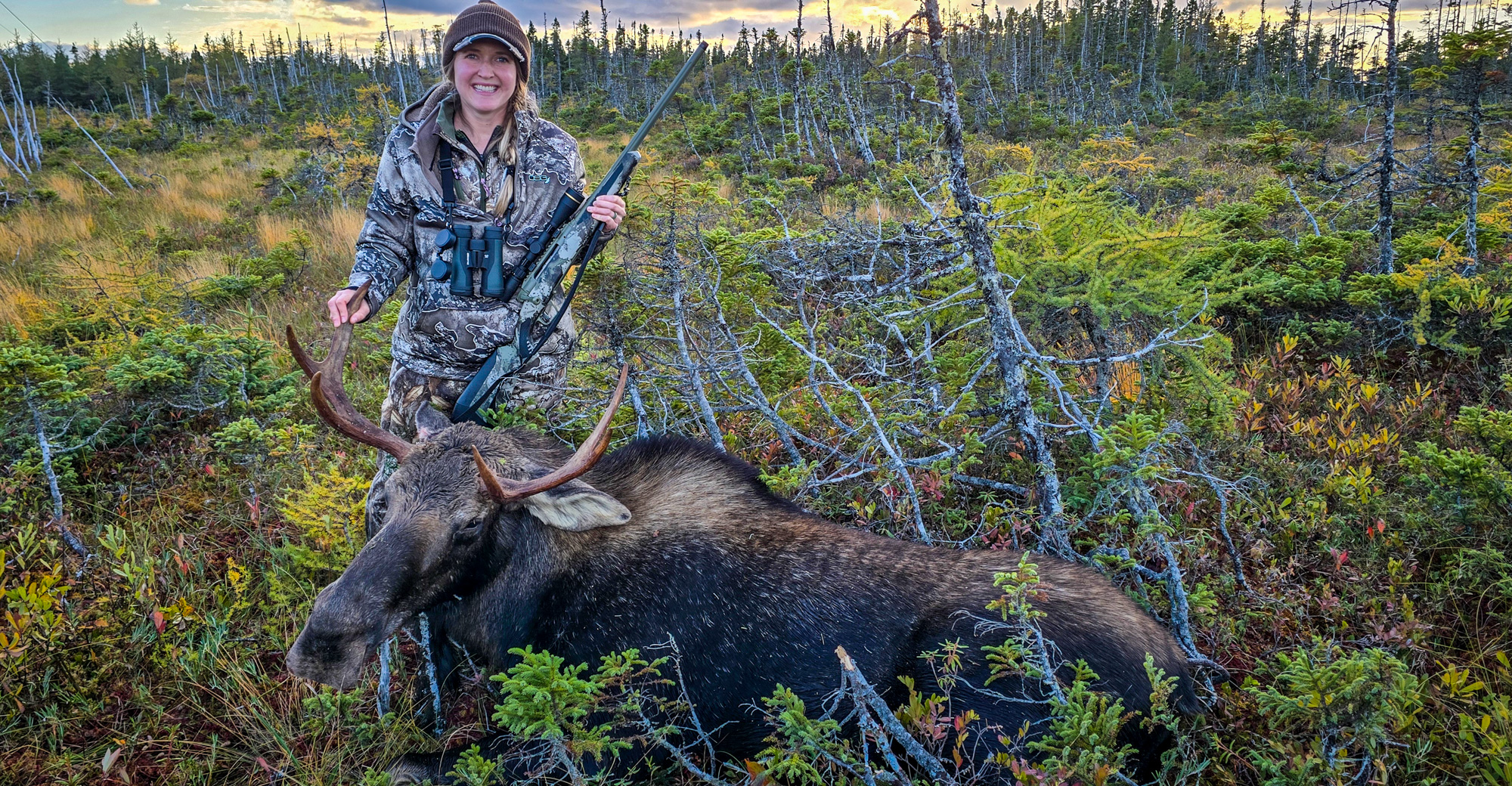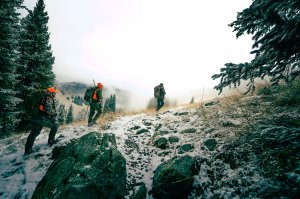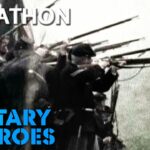The first day of the hunt was one I’ll never forget, though not for the reasons I expected. We’d been watching and waiting when the stillness of the Newfoundland bog was broken by a sound that stopped me cold — antlers crashing against trees.
My guide, Trevor Green, leaned in, his voice barely a whisper but trembling with excitement.
“Ohhh that’s a big bull, Ali! That’s a big bull.”
Seconds later, he stepped into the open — a 20-point bull, massive and regal. It was my first time seeing a bull moose in rut, and he was every bit as majestic as I’d imagined. He stomped into the bog, thrashing and snorting, his body language daring anything to challenge him.
I raised my rifle. I was trembling, overwhelmed by the size of the animal before me and the weight of the moment. Freehand, I tried to steady myself, knowing this might be my only chance. I pulled the trigger.
My shot missed.
Shaking even more, I reloaded and raised my rifle again.
Again, I missed.
As the bull turned and disappeared into the timber, my heart sank. Trevor and I sat in silence, the enormity of what had just happened washing over us.
“That was one of the biggest bulls I’ve ever seen,” he said softly, almost to himself.
Disappointment hit me hard at that moment. I had let down my guide and myself. Worst of all, though, I hadn’t come through for my dad.
Carrying His Dream
This moose hunt wasn’t just any trip — it was supposed to be his trip.
In 2022, my dad had booked a moose hunt through White Cliff Lodge near Gander, Newfoundland, with my brother, two cousins, and a friend. As lifelong residents of northern Minnesota, moose can only be admired from afar — there’s no longer a regular hunting season for them in this state. And so this trip was the culmination of years of planning. Then, in June 2023, everything changed. At the age of 61, my dad was diagnosed with Stage 4 glioblastoma. Brain cancer.
The diagnosis was devastating, but my dad isn’t the kind of man to give up without a fight. He had surgery to remove the initial tumor, then started radiation and chemotherapy. He went on a strict diet, which meant giving up sweet treats in the stand and celebrating a successful hunt with a cold beer. None of that mattered anymore. Alongside his care team at the Mayo Clinic in Rochester, he also turned to a naturopathic oncologist. He was fighting for his life.
I wasn’t even supposed to be on this hunt. Although Dad originally invited me to join him, I was pregnant with my third child at the time and couldn’t justify the cost in this season of life. But after his diagnosis, something shifted in me. I wanted one last big hunt with my dad and a chance to share his dream. I made sure there was still room on the hunt, mailed my deposit to the outfitter to make it official, and started preparing for the trip.

At first, it seemed like his treatment was working well. He was optimistic, determined to make the hunt in October 2024. For a while, we believed he’d make the hunt. But this June, the cancer returned — a new tumor, aggressive and inoperable. The radiation caused severe swelling and by September, his decline was rapid. He made the heartbreaking decision to cancel the trip. And I made the decision to go without him.
I knew going without Dad would be difficult, and doubly so as a stay-at-home mom with a young family. But this hunt wasn’t just for me — it was for him, and for the dream of moose hunting that Dad had carried for a lifetime. Now I carried it for him, step after step, through the bogs and tamaracks of Newfoundland.
The Daily Grind

Each day of the hunt began long before the sun rose. My daughter had been born a year before and I was still nursing. Each day my alarm went off at 3:45 a.m., giving me enough time to pump, get my gear ready, take a nervous sip of black coffee and prepare for the long day ahead. By 4:45, I was layered up against the cold and ready to go.
Our mornings started with a short but eerie boat ride across a still, dark pond. The water was quiet except for the rumbling motor slicing through the silence, and the endless darkness. On the far shore, we climbed into the truck and drove deeper into the wilderness to our hunting spot.
The combination of exhaustion and excitement fueled me. Every step of the journey felt like another step closer to fulfilling not just a dream, but a promise I’d made to my dad. My brother, Derick, who hunted with his own guide, was on a similar mission.

Hunting moose in Newfoundland isn’t for the faint of heart. The ground proved soft and unsteady, like a wet sponge enveloping my boots with each step. Cut logs and slick rocks tripped me, and dense alder brush seemed determined to tangle my legs. Brittle tamarack branches snapped underfoot and clawed at my jacket as I pushed through them. Each step demanded focus, and every movement was deliberate. My legs burned from the constant effort. Yet there was no choice but to push on.
There were ripe, red partridge berries scattered through the moss. Trevor stopped to taste a few, but I didn’t. I was too focused on keeping up, on making every step count. My determination to succeed — to not waste a second of this hunt — was actually distracting me. Dad would’ve stopped to try one.

But even in my hurry, the landscape wasn’t completely lost on me. I grew up as my dad’s shadow, watching and listening to him point out nature’s beauty in the details. When I arrived, the bog seemed like a muted palette of greens and brown. Up close, it was a masterpiece. The longer I hunted, the more I came to appreciate the golden moss, muted greens, and fiery leaves. Even the tiniest details stood out.
What surprised me the most was the silence. The bog was utterly still and the soft moss seemed to absorb all the sound. It was the kind of quiet that made you feel small and significant at the same time.

Every 20 minutes or so, Trevor would stop and bellow his cow call, two or three times, mimicking the motions of a cow’s head. We moved from bog to bog, calling into the stillness, waiting for an answer, and scanning every inch of the horizon. Tracks in the mud or a trunk rubbed raw would send a surge of excitement through me. It reminded me of hunting with my dad when I was a kid, how he’d crouch down to show me deer tracks, teaching me how to truly read the woods and the critters that lived there.
This time, it was moose sign, and I couldn’t help but think about how proud he’d be to see me applying his lessons in such a wild and rugged place. Every track I saw felt like a little nudge from him, as if he were walking alongside me, whispering, “Keep going, sweetheart, you’ll find him.”
Hunting for a Second Chance


But the rut was dwindling, and the bulls had gone quiet. We couldn’t get a single one to come into our calls. That meant covering even more ground, pounding up to 27,000 steps through the bog each day, searching for signs that might lead us to a moose.
That first bull I encountered wasn’t the only one to test me. Over the next few days, three more bulls brought my heart rate up and my gun to my shoulder, only for the circumstances or my own judgment to pull me back.
One bull appeared 400 yards across a bog, standing at the edge of the woods with a cow tucked safely behind him. He was loyal, unwilling to leave her side or step into the open. We watched him, hoping he might give me a chance, but he never did.
Another time we were walking a trail when Trevor stopped suddenly. At the end of the path, only 40 yards away, stood a bull. Trevor spotted him first, and just as I raised my rifle, the bull stepped behind some brush. I could see where his vitals should have been and could have taken the shot through the branches. But I wasn’t 100 percent sure. And if I wasn’t certain, I wasn’t shooting.
On the morning of the fourth day, tired and desperate, I saw another bull. This time, the only shot he presented was a headshot. For a moment, desperation tugged at me. I let the moment pass. I couldn’t bring myself to take a shot that didn’t feel right. Dad would’ve done the same.
Dad’s Bull

“You’ll have to be my ears today, Ali,” Trevor told me.
Trevor wears hearing aids, but on the fourth day of our hunt he forgot them at spike camp. We were already across the pond and it was no use going back for them now.
With the rut nearly finished, Trevor and I decided to spend the afternoon set up in the tamaracks on the edge of a bog. As a deer hunter, I was more than comfortable with that plan. Before settling in, he fashioned a makeshift shooting stick, ensuring I wouldn’t face the same shaking and nerves that had cost me on the first day. But Trevor wasn’t satisfied with our position.
“Let’s move back,” he said, motioning to the open area to our left. We were at the edge of the tamaracks, in a rounded corner of the treeline. “If a moose comes from that way, we’ll get busted.”
So, we moved deeper into the tamaracks. Trevor tucked in behind me to call and then settled in to have a smoke, using cow urine to mask the scent as we waited. As he whispered predictions in his Newfoundlander accent — “Five-tirdy-five, that’s when your moose is coming” — I couldn’t help but smile.
Related: An Old-School Western Mule Deer Hunt, in Memory of Two Midwestern Dads
As we sat there waiting, Trevor’s prediction lingered in my mind. My time on this hunt was running out. And, like Trevor, my dad’s doctors can only predict how much time my father may have with us. And as best anyone can guess, he doesn’t have much left.
We are now measuring our time together in moments and memories, like this hunt — his hunt. It could have felt strange, even cruel, perhaps, to be spending these precious days away from him, enjoying a hunt he had always wanted to do while he stayed home. But that’s never been my dad. He’s taught us to live our lives to the fullest, and he has always found pride and joy in our own success. Most of all, I am grateful to still be able to talk to him about this hunt, sharing the highs and lows as I always have. Because when you’re running out of time, while hunting or in life, every moment becomes that much more special.
At 5:22, I heard it: the splash of a hoof in the bog. Moose. It came from the left — exactly where we’d been sitting before moving. Trevor had been right.
This bull was alone, walking slowly with his nose in the air, circling from the far side of the bog in an attempt to wind any danger ahead. With just six points he was smaller than the one I’d missed, but I didn’t hesitate. At 65 yards, he was broadside. I raised my gun, steady and confident, with no shaking and no need for the shooting stick. My first shot struck his heart. In the smoothest motion, I pulled back the bolt of my .30-06 and sent another round. Another heart shot. Then again.



Every moment had led to this: A 6-point bull and a prayer answered.
When the bull finally went down, I exhaled, a wave of relief and gratitude washing over me. Trevor stood beside me, grinning. But all I could think about was my dad.
Read the full article here





